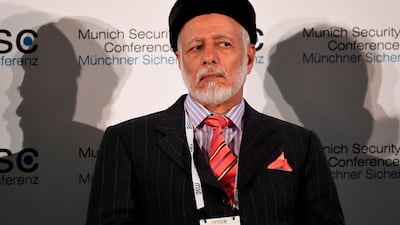The risk of a military confrontation is higher in the Strait of Hormuz than anywhere else in the region, partly because of the number of foreign navy ships guarding it, Oman's Minister for Foreign Affairs said.
The strait between Iran and Oman, 33 kilometres wide at its narrowest point, is the passage for about 30 per cent of all crude and other oil products traded by sea.
Friction between Iran and the West led nations to send task forces to protect shipping there.
Washington has blamed Tehran for attacks on international merchant vessels in or near the area, which Iran denies.
"There are a lot of military ships in the Hormuz and our concern is there could be a mistake," Yusuf bin Alawi, Oman's Minister for Foreign Affairs, said at the Munich Security Conference at the weekend.
Oman is working to reduce tension in the Gulf and sees prospects of talks between Iran and the US, Mr bin Alawi said.
“We are in touch with the US and Iran. We feel that there is a possibility of dialogue between them,” he told the state-run Oman News Agency.
“We don’t expect military military confrontation in the region at the moment.”
Tehran has threatened reprisals for the January 3 killing of its top military commander, Qassem Suleimani, in a US drone strike, although regional analysts have said is unlikely to involve an intervention in the strait.
Iran cannot legally close the waterway because part of it is in Omani territorial waters.
But ships that sail through are close to Iranian waters and Iran's Islamic Revolutionary Guard Corps' navy.
Washington, which in 2018 pulled out of an international nuclear deal with Iran and reimposed sanctions on it, is leading a naval mission to protect oil tankers and cargo ships in the waterway.
The UAE, Saudi Arabia, Bahrain, Britain and Australia have joined the US in Operation Sentinel, while France is leading a separate European mission.
Japan, Russia, South Korea and China have also sent ships to the region.
There have been periodic confrontations between the Revolutionary Guard and the US military in the Gulf in recent years.
US officials have said closing the Strait of Hormuz would be crossing a "red line" and America would take action to reopen it.
"The only thing for Kuwait, Bahrain and Qatar is the Strait of Hormuz, and if it is blocked we will all be in trouble so that's why it is important to maintain the safeguard of maritime navigation," the Kuwaiti Foreign Minister, Sheikh Ahmad Al Sabah, said in Munich.
Juliot Vinolia’s checklist for adopting alternate-day fasting
- Don’t do it more than once in three days
- Don’t go under 700 calories on fasting days
- Ensure there is sufficient water intake, as the body can go in dehydration mode
- Ensure there is enough roughage (fibre) in the food on fasting days as well
- Do not binge on processed or fatty foods on non-fasting days
- Complement fasting with plant-based foods, fruits, vegetables, seafood. Cut out processed meats and processed carbohydrates
- Manage your sleep
- People with existing gastric or mental health issues should avoid fasting
- Do not fast for prolonged periods without supervision by a qualified expert
500 People from Gaza enter France
115 Special programme for artists
25 Evacuation of injured and sick
COMPANY PROFILE
Name: Kumulus Water
Started: 2021
Founders: Iheb Triki and Mohamed Ali Abid
Based: Tunisia
Sector: Water technology
Number of staff: 22
Investment raised: $4 million
Mobile phone packages comparison
MOUNTAINHEAD REVIEW
Starring: Ramy Youssef, Steve Carell, Jason Schwartzman
Director: Jesse Armstrong
Rating: 3.5/5
DMZ facts
- The DMZ was created as a buffer after the 1950-53 Korean War.
- It runs 248 kilometers across the Korean Peninsula and is 4km wide.
- The zone is jointly overseen by the US-led United Nations Command and North Korea.
- It is littered with an estimated 2 million mines, tank traps, razor wire fences and guard posts.
- Donald Trump and Kim Jong-Un met at a building in Panmunjom, where an armistice was signed to stop the Korean War.
- Panmunjom is 52km north of the Korean capital Seoul and 147km south of Pyongyang, North Korea’s capital.
- Former US president Bill Clinton visited Panmunjom in 1993, while Ronald Reagan visited the DMZ in 1983, George W. Bush in 2002 and Barack Obama visited a nearby military camp in 2012.
- Mr Trump planned to visit in November 2017, but heavy fog that prevented his helicopter from landing.
At a glance
Global events: Much of the UK’s economic woes were blamed on “increased global uncertainty”, which can be interpreted as the economic impact of the Ukraine war and the uncertainty over Donald Trump’s tariffs.
Growth forecasts: Cut for 2025 from 2 per cent to 1 per cent. The OBR watchdog also estimated inflation will average 3.2 per cent this year
Welfare: Universal credit health element cut by 50 per cent and frozen for new claimants, building on cuts to the disability and incapacity bill set out earlier this month
Spending cuts: Overall day-to day-spending across government cut by £6.1bn in 2029-30
Tax evasion: Steps to crack down on tax evasion to raise “£6.5bn per year” for the public purse
Defence: New high-tech weaponry, upgrading HM Naval Base in Portsmouth
Housing: Housebuilding to reach its highest in 40 years, with planning reforms helping generate an extra £3.4bn for public finances

